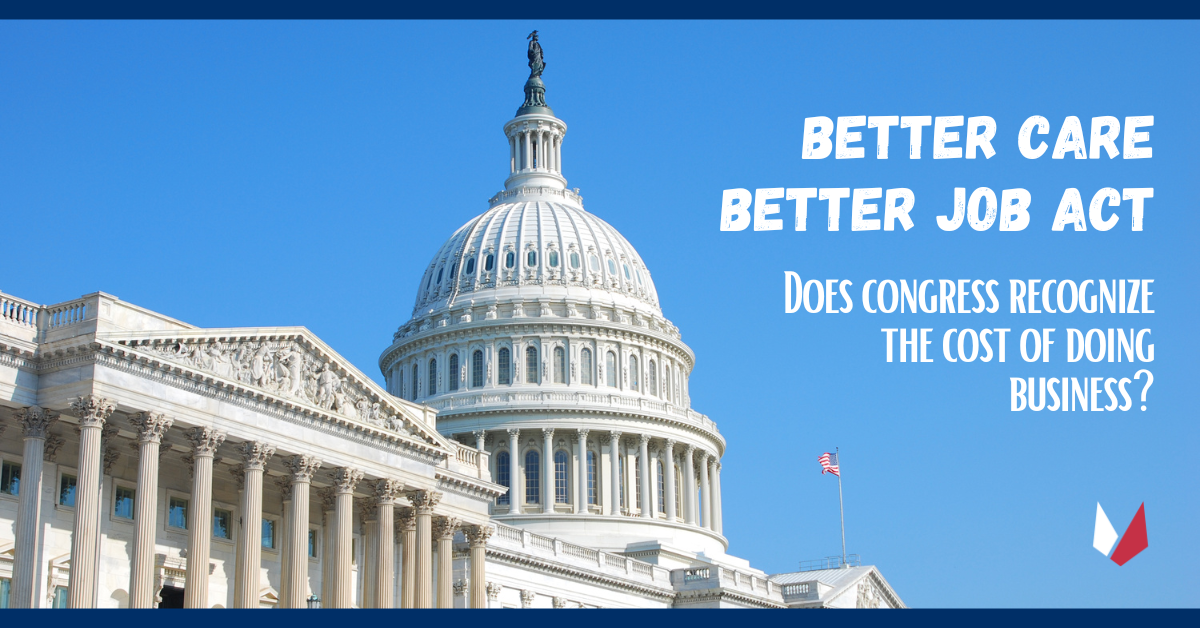The Better Care Better Jobs Act Reintroduced

In January, Senator Bob Casey (D-PA), Congresswoman Debbie Dingell (D-MI-6), energy and commerce ranking member Frank Pallone (D-N.J.), Jan Schakowsky (D-IL, Congresswoman Doris Matsui (D-CA) and 39 co-sponsors in the Senate reintroduced the Better Care Better Jobs Act. The original bill was introduced by Bob Casey (D-PA) in June of 2021 and was referred to the Committee on Finance, where it eventually stalled. The bill is intended to expand access to home and community-based services (HCBS) for older adults, individuals with disabilities, and injured workers and improve caregivers’ pay and benefits.
According to the bill, home care workers earn a median wage of $13 per hour, with few or no benefits, and about 18% of them live in poverty, contributing to the sector’s high turnover rates. The caregiver shortage has increased over the last five years and was exacerbated by the COVID pandemic. COVID also highlighted the desire for families to keep their loved ones at home. By doing so, families can decide what is best for their loved ones rather than a facility making a unilateral decision based on what is best for the facility’s general population. Home care became the best option but often met with limited access to state and federal funding.
With the increased demand for higher caregiver wages, home care costs have risen for agencies to stay in business, creating a dilemma for the agency and the family. The increased cost of home care, for many, is becoming unaffordable. Medicaid, VA benefits, and other programs assisting low-income senior adults will need to drastically increase the reimbursement rates to attract quality agencies and keep agencies in the business. Caregiver wages are important, but Congress should recognize the cost of doing business when considering increased reimbursements.
The Better Care Better Jobs Act is a positive move forward and can open opportunities for more agencies to participate in HCBS programs. Some key objectives include:
- Qualifying states will receive a permanent 10% increase in Medicaid match funding for delivering Medicaid home and community-based services. For states to qualify, states would be required to provide coverage for personal care services; expand support for family caregivers; adopt programs that help people navigate enrollment and eligibility; expand access to behavioral health care; improve coordination with housing, transportation, and employment supports; and develop or improve programs to allow working people with disabilities to access home and community-based services.
- Encourage innovative models that benefit direct care workers and care recipients.
- Support quality and accountability.
- The bill would strengthen and expand the HCBS workforce by addressing HCBS payment rates to promote recruitment and retention of direct care workers; regularly updating HCBS payment rates with public input; passing rate increases through to direct care workers to raise wages; and updating and developing training opportunities for this workforce as well as family caregivers.
- Permanently authorize protections against impoverishment for individuals whose spouses receive Medicaid HCBS and make the Money Follows the Person Rebalancing Demonstration permanent.
Senator Casey stated, “The Better Care Better Jobs Act is a generational investment in home care. It’s about caring for our loved ones and making the smart, economical choice for families and communities across all levels of the government to strengthen this workforce.” This bill would add over $300 billion toward expanding and improving access to home and community-based services.
The bill is supported by the National Association for Home Care and Hospice, the National Council on Aging, the National Council on Independent Living, the National Academy of Elder Law Attorneys, and thirteen other organizations in the senior adult industry.
What does this mean for your agency? If passed, the Better Care Better Jobs Act would enhance Medicaid funding for home care and provide home care options for approximately 650,000 people on waiting lists. In the fiscal year 2020, 14 states did not cover personal care services (PCS) for those not on waivers. The expanded state plan PCS in these states could address the immediate needs of those not eligible for waiver services or who are on a waiting list. In addition, the bill requires states to expand financial eligibility for HCBS up to federal limits. Economists estimate that if all states raise the income limits for HCBS waivers to the federal maximum allowable, this will result in up to 3.2 million new individuals who could be eligible for Medicaid funding. If you are currently accepting Medicaid clients, this could open opportunities for increased retention and attracting new caregivers. It could also expand clientele through Medicaid and other government programs. If you aren’t a Medicaid provider, this could be a time to explore the option. In most cases, Medicaid recipients who are either wartime Veterans or surviving spouses of a wartime Veteran can combine Medicaid HCBS and Pension with Aid and Attendance to increase home care hours.
Sources: Senator Bob Casey –https://www.casey.senate.gov/news/releases/casey-dingell-introduce-bill-to-provide-historic-permanent-investment-in-home-care-for-seniors-and-people-with-disabilities
Kff.org, State Health Facts
Kff.org, Appendix Table 6: State Adoption of Medicaid HCBS, by Authority, FY 2020
